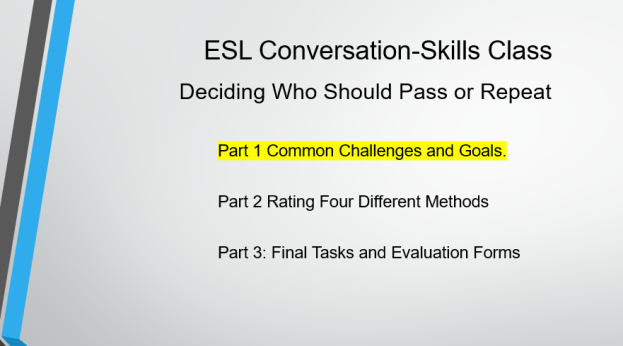
(This posting includes a handout which you are welcome to use with your students.) *
In Part 1, • Common Challenges and Goals for Final ESL Conversation Speaking Tasks , I described the challenges Conversation teachers face when deciding which students should be promoted to the next level. In Part 2, • Final ESL Conversation Speaking Tasks: Rating Three Methods I compared three different methods for determining this.
In this Part 3, I’ll share some final tasks for pairs and triads and evaluation forms that teachers can use to help them make the decision about the level each student should be in the next term.
My colleague was totally dumbfounded early in the term. Somehow some unprepared students in her Level 4 Conversation Class had been passed from Level 3. Then we found out how this happened. For the final task in Level 3, the teacher had students do presentations. Their final grade was mostly based on how well they had prepared and memorized their presentation monolog. Thus, students who had not developed actual conversation-skill techniques, like asking questions, using rejoinders, responding with details, and asking for clarifications, were able to pass Level 3.
In a truly student-centered Conversation class, most activities will revolve around students working in pairs, triads and small groups. Also, during the activities, they will be practicing techniques that will help them develop their conversation and discussion skills. Thus, it makes the most sense that their final task should mirror those two points.
Sample final task formats and evaluation forms.
(Notice: These could be used as a midterm and/or final exam.)




 I asked him how he felt about it. He said that he was feeling discouraged because he really tries to be active in conversation, not only telling his ideas and opinions but also responding to and including other. So he
I asked him how he felt about it. He said that he was feeling discouraged because he really tries to be active in conversation, not only telling his ideas and opinions but also responding to and including other. So he 
